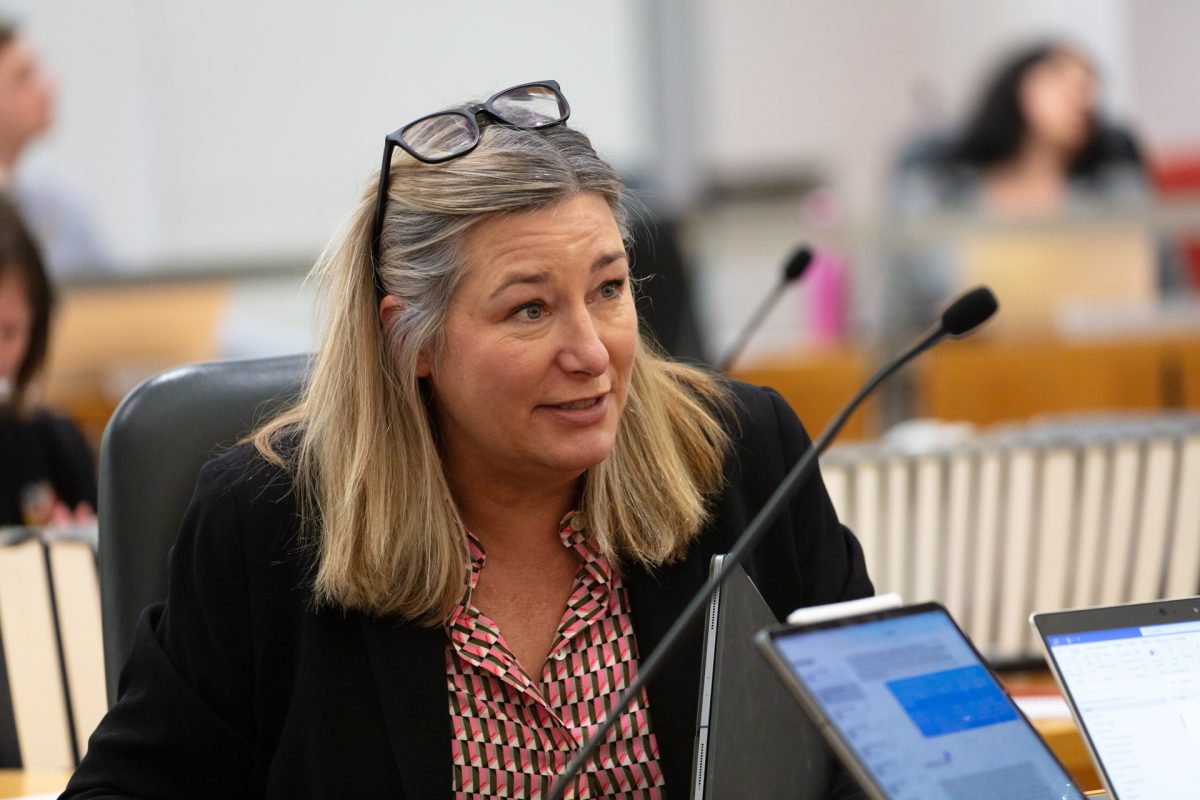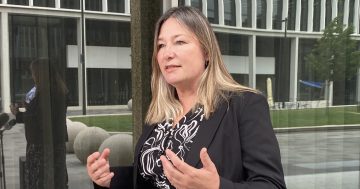
For Education Minister Yvette Berry, equity is at the core of her approach to schools. Photo: Thomas Lucraft.
Education Minister Yvette Berry is a champion of equity in ACT schools, but should it be the overriding principle driving the Territory’s education system?
Speaking ahead of an education summit at the University of Canberra last Friday (20 October), Ms Berry repeatedly returned to the importance of equity when asked about teacher practices and school performance.
Her mantra is that every child in the ACT should be able to receive a great education.
Who could argue with that?
But just what constitutes a great education?
The summit to mark the halfway point of the ACT’s 10-year Future in Education Strategy was billed as an opportunity for everybody involved in education – including teachers, students, parents, the public, and Catholic and independent sectors – to come together to exchange ideas about where the next five years should lead.
It was held amid vigorous discussion in education about the pedagogical direction of schools, particularly the debate about inquiry-based learning and explicit teaching strategies.
The ACT Education Directorate argues that its teachers deploy both, depending on the circumstances, but the emphasis in ACT public schools has been on the former, philosophically geared towards encouraging discovery and fostering student motivation and agency.
This has been a dominant feature of the education landscape for some time, but falling standards in literacy and numeracy and disengagement from learning in general among many students have prompted a rethink in some school systems.
The response has been explicit or direct teaching, which its advocates are quick to say is not a back-to-basics approach but a science-based strategy about how children’s brains work, the importance of practice or repetition and with a general principle that kids need tools before they can actually discover anything for themselves.
Asked whether the ACT was open to recalibrating its education strategy in light of this debate, Ms Berry said the summit was about looking at ways to improve academic outcomes, but also equity and wellbeing.
For her, the issue of equity cannot be disengaged from learning outcomes as a whole.
“Research shows that when you address equity within our schools, every student’s outcomes improve,” Mr Berry said.
“What we are doing is making sure that every child, regardless of their background or circumstances, gets the same equal chance at a great education. When that occurs, every child succeeds.”
Catholic Education director Ross Fox was also at the summit and has a strong view about equity, although coloured by his schools’ embrace over the past few years of explicit teaching, which he said had produced dramatic improvements.
“We share a commitment with the Minister and the ACT Government to equity for every child,” he said. ”
“We think that means high-quality instruction, high-quality learning opportunities, in every lesson, every classroom, every day.
“We’re working hard to support our teachers. We believe that if you want a child to know something, and a child’s life is so enriched through more knowledge, that the best way for them to learn is for the teacher to tell them explicitly and then for them to have an opportunity to practise and solidify that knowledge.”
It’s a method that Mr Fox said had been turning around the performance of Catholic schools and resulting in happier students, and Catholic Education had compelling data supporting this that he wants to share with other schools.
“We believe teacher practice pedagogical approaches, curriculum resources are all key to really supporting the professionalism of teachers to deliver equity in our classrooms, across our schools and across our system,” Mr Fox said.
“We’ve currently got surveys being returned by our teachers saying as a result of our initiatives that they’ve saved six to 10 hours a week from their workload because of the support we’re providing. Instructional approaches are key to achieving equity for us.”
Is that something Ms Berry was interested in?
She said the ACT was open to any innovative teaching practices that worked, but there was no simple answer.
“Education doesn’t stand still, and we want to understand what the gaps are and how they’ve been caused and how we can improve on them,” she said.
But equity from a social justice perspective remains at the centre of her thinking, and she is loath to talk about any perceived failing of ACT public schools, particularly when it comes to teaching practices.
The trouble is the ACT is the one jurisdiction in the country where equity could be considered a lesser issue than ensuring learning outcomes matched the Territory’s privileged socio-economic profile.
This has been the thrust of the NAPLAN scores debate. ACT students perform well compared with other jurisdictions but, given their advantages, should do better.
Ms Berry won’t have a bar of this and doggedly defends the ACT’s public schools, teachers and their methods.
The question is, does her admitted focus on equity – she was behind the government actually measuring the equity gap in ACT schools – blind her to developments elsewhere that might improve school performance?
Equity is important, but you can still have every opportunity, and in Canberra, there are plenty in this category, and still fail to achieve.
Unfortunately, the kids who really need a leg-up don’t have fallback options – they need an education to rise out of their circumstances.
A little less worry about equity and a bit more focus on successful teaching and learning outcomes would do these students more good than being able to go on the latest school excursion.





















